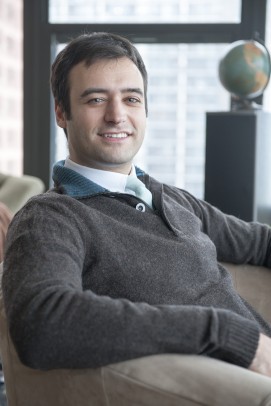Alumnus finds similarities in differences

Working with people who have disabilities, “you can learn to know what it is to be human,” says UIC alumnus Luca Badetti. — Photo: Roberta Dupuis-Devlin
Sometimes people look at others who have intellectual disabilities as “angelic or animalistic,” says Luca Badetti.
“Some think they’re always smiling, always happy and innocent, while others perceive them as not acting appropriately enough and look down on them,” he said.
But individuals with intellectual disabilities are neither angels nor animals, Badetti said. “They’re people, like anyone else.”
Having just completed his Ph.D. in disability studies at UIC, Badetti is community coordinator for L’Arche Chicago, which maintains two residences — Angel House, on Austin Boulevard on the West Side, and Peace House, in west suburban Forest Park.
Each is home to four people who have intellectual disabilities, ranging in age from in their 30s to 70s, and three or four assistants.
The eight individuals who have disabilities are referred to as “core members,” from cor, the Latin word for heart, because they are the heart of the community.
A third home will open this year. Financial support comes from donations and the state of Illinois.
“An interesting thing about L’Arche is that people provide care, and after some time, become friends,” Badetti said. “Disabilities labels lose their hold, and the emphasis is on the person.
“It’s good to live among people who are different from us. If we just stick with people who are what some might call ‘able-bodied’ or ‘able-minded,’ we’re missing a chance to open our hearts.
“People with disabilities need support, but we need them too.”
Badetti’s first L’Arche community, where he lived for a year, was near Boston. Once when he returned after a vacation, Jimmy, a core member with Down syndrome, came up to him and asked, “Did you miss me while you were gone?”
“Now, most of us easily say, ‘I missed you,’ but we don’t always have the courage to say, ‘Am I important to you?’” Badetti said. “There was love and friendship in that question. There was courage; there was vulnerability.”
His four years with such communities have taught him important truths.
“You can learn to know what it is to be human, and to grow into that,” he said. “There is a simplicity, a living from the heart rather than just the mind, an honesty, and a slower sense of time that I think pinpoints what are the great things about being human.”
L’Arche was founded in France in 1964 by philosopher and theologian Jean Vanier after he invited two men with intellectual disabilities who were living in institutions to move into his home in the town of Trosly-Breuil.
It was the first L’Arche community. Today there are 147 in 35 countries, including L’Arche Chicago, which began in 2000. Vanier, 87, still lives in Trosly-Breuil.
At the two local homes, “we cook together, go to events in the city, watch TV, pray and hang out,” Badetti said.
As community coordinator, a job he took on two years ago, “my role is to support community life, spiritual life and quality of life of the people in the community,” he said.
His duties range from leading assistants’ meetings and organizing events and celebrations to training assistants and meeting with people one on one.
In addition to Chicago and Boston, Badetti lived for two years at the L’Arche community in Washington, D.C. He also spent a semester at the Rome community and the original community in Trosly-Breuil.
Badetti grew up in Rome, where he lived for 10 years, and Milan, for four years, before moving to this country with his parents.
He earned a bachelor’s degree from Franciscan University of Steubenville in Ohio, and a master’s from the Institute for the Psychological Sciences in Arlington, Virginia.
His Ph.D. dissertation, which he defended Dec. 18, is on “the relationship between the self-determination of people with intellectual disabilities and community life,” he said.
As for his life post-Ph.D., “I like my community work,” he said. “It will be interesting to see if I can combine it with more academic work.”
Badetti, who lives in Chicago’s Edgewater neighborhood, enjoys writing and reading poetry in Italian, and has published a few poems in Italy.
It’s his hope and belief that a world troubled by tragic events, such as attacks by international terrorists and police shootings here at home, can learn from L’Arche’s example.
“I hope L’Arche can be a sign of peace that it’s possible and great to live together in our similarities and in our differences,” Badetti said.
